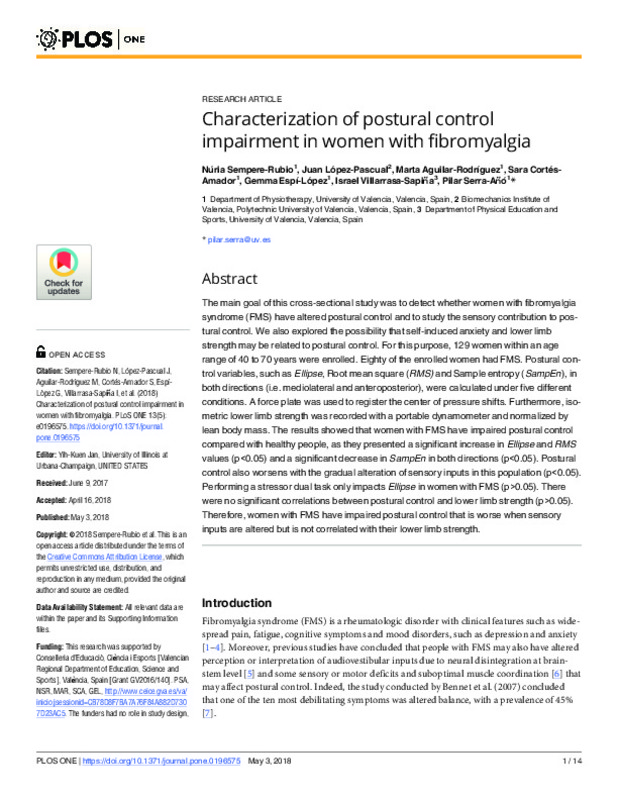JavaScript is disabled for your browser. Some features of this site may not work without it.
Buscar en RiuNet
Listar
Mi cuenta
Estadísticas
Ayuda RiuNet
Admin. UPV
Characterization of postural control impairment in women with fibromyalgia
Mostrar el registro sencillo del ítem
Ficheros en el ítem
| dc.contributor.author | Sempere-Rubio, Nuria
|
es_ES |
| dc.contributor.author | Lopez Pascual, Juan
|
es_ES |
| dc.contributor.author | Aguilar-RodrÍguez, M.
|
es_ES |
| dc.contributor.author | Cortés, S.
|
es_ES |
| dc.contributor.author | Espi, G.
|
es_ES |
| dc.contributor.author | Villarrasa, I.
|
es_ES |
| dc.contributor.author | Serra Añó, Pilar
|
es_ES |
| dc.date.accessioned | 2019-09-26T10:25:03Z | |
| dc.date.available | 2019-09-26T10:25:03Z | |
| dc.date.issued | 2018 | es_ES |
| dc.identifier.issn | 1932-6203 | es_ES |
| dc.identifier.uri | http://hdl.handle.net/10251/126427 | |
| dc.description.abstract | [EN] The main goal of this cross-sectional study was to detect whether women with fibromyalgia syndrome (FMS) have altered postural control and to study the sensory contribution to postural control. We also explored the possibility that self-induced anxiety and lower limb strength may be related to postural control. For this purpose, 129 women within an age range of 40 to 70 years were enrolled. Eighty of the enrolled women had FMS. Postural control variables, such as Ellipse, Root mean square (RMS) and Sample entropy (SampEn), in both directions (i.e. mediolateral and anteroposterior), were calculated under five different conditions. A force plate was used to register the center of pressure shifts. Furthermore, isometric lower limb strength was recorded with a portable dynamometer and normalized by lean body mass. The results showed that women with FMS have impaired postural control compared with healthy people, as they presented a significant increase in Ellipse and RMS values (p<0.05) and a significant decrease in SampEn in both directions (p<0.05). Postural control also worsens with the gradual alteration of sensory inputs in this population (p<0.05). Performing a stressor dual task only impacts Ellipse in women with FMS (p>0.05). There were no significant correlations between postural control and lower limb strength (p>0.05). Therefore, women with FMS have impaired postural control that is worse when sensory inputs are altered but is not correlated with their lower limb strength. | es_ES |
| dc.description.sponsorship | This research was supported by Conselleria d'Educacio, Ciencia i Esports [Valencian Regional Department of Education, Science and Sports], Valencia, Spain [Grant GV2016/140]. PSA, NSR, MAR, SCA, GEL, http://www.ceice.gva.es/va/inicio:jsessionid=CB78D8F7BA7A76F84A8827307D23AC5. The funders had no role in study design, data collection and analysis, decision to publish, or preparation of the manuscript. | es_ES |
| dc.language | Inglés | es_ES |
| dc.publisher | Public Library of Science | es_ES |
| dc.relation.ispartof | PLoS ONE | es_ES |
| dc.rights | Reconocimiento (by) | es_ES |
| dc.title | Characterization of postural control impairment in women with fibromyalgia | es_ES |
| dc.type | Artículo | es_ES |
| dc.identifier.doi | 10.1371/journal.pone.0196575 | es_ES |
| dc.relation.projectID | info:eu-repo/grantAgreement/GVA//GV%2F2016%2F140/ | |
| dc.rights.accessRights | Abierto | es_ES |
| dc.contributor.affiliation | Universitat Politècnica de València. Instituto Universitario Mixto de Biomecánica de Valencia - Institut Universitari Mixt de Biomecànica de València | es_ES |
| dc.description.bibliographicCitation | Sempere-Rubio, N.; Lopez Pascual, J.; Aguilar-Rodríguez, M.; Cortés, S.; Espi, G.; Villarrasa, I.; Serra Añó, P. (2018). Characterization of postural control impairment in women with fibromyalgia. PLoS ONE. 13(5). https://doi.org/10.1371/journal.pone.0196575 | es_ES |
| dc.description.accrualMethod | S | es_ES |
| dc.relation.publisherversion | http://doi.org/10.1371/journal.pone.0196575 | es_ES |
| dc.type.version | info:eu-repo/semantics/publishedVersion | es_ES |
| dc.description.volume | 13 | es_ES |
| dc.description.issue | 5 | es_ES |
| dc.identifier.pmid | 29723223 | |
| dc.identifier.pmcid | PMC5933724 | |
| dc.relation.pasarela | S\384784 | es_ES |
| dc.contributor.funder | Generalitat Valenciana |








